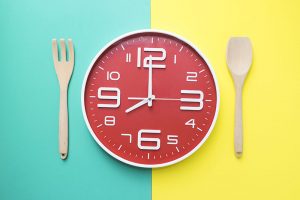Tis the season to watch waistlines expand thanks to the eggnog, roast goose and the many nights laying curled up watching Christmas favorites. Soon, New Year’s Day will arrive along with the need to lose some of our holiday pounds before warm weather arrives. For many people, this means counting calories and increasing one’s amount of exercise. However, new studies suggest that these are not the only important components of weight loss: Adhering to certain principles of chronobiology may be important in achieving and maintaining weight loss as well.
You Can’t Outrun Calories, Expert Say
 For many people, exercising seems like the most rational way to lose unwanted pounds. On an intuitive level, this makes sense. Exercising more creates a calorie deficit, one that can be made up by burning existing fat calories in the body. In addition, exercise provides an aerobic workout that raises the basal metabolism rate. It also builds muscle, which is more metabolically active than fat and thus will burn more calories in the long run.
For many people, exercising seems like the most rational way to lose unwanted pounds. On an intuitive level, this makes sense. Exercising more creates a calorie deficit, one that can be made up by burning existing fat calories in the body. In addition, exercise provides an aerobic workout that raises the basal metabolism rate. It also builds muscle, which is more metabolically active than fat and thus will burn more calories in the long run.
There are clearly many benefits to exercise. However, research suggests that they are not enough to sustain weight loss on their own in most cases. This is especially true for women. Researchers split a group of volunteers into three groups, one that did rigorous exercise three times a week for four weeks, a group that did the same for eight weeks, and a last that did no exercise at all. At the end of the research, none of the groups had lost weight.
How can people burn calories without losing weight? Researchers found that the more women exercised, the more they produced hormones associated with hunger. That is, they were hungrier and thus ate more to compensate for their additional exercise, preventing any weight loss. Their bodies were determined to keep a stable weight even with the extra calories burned in exercise. Many dieters can confirm the findings in this study; that we feel hungrier than ever after a good workout.
Calories In, Calories Out: Just Part of the Story
Our bodies are regulated to maintain homeostasis, or stability, in all areas. This means that most people’s bodies actually don’t want to lose weight, even if the owners wish to do so. When we exercise more or eat less, our bodies respond with increased hunger hormones and a metabolic slowdown. While weight loss is still possible, many people can benefit from “diet hacks” that increase their results. According to new research, timing your meals carefully may be one of these important diet hacks.

Could Meal Timing be the Secret to Holiday Weight Loss?
Experts recommend a mixed approach to weight loss. It is important to cut calories and to exercise more; in fact, these are both necessary for sustainable weight loss. However, taking care of the circadian rhythm is also an important step. People who wish to lose weight should get plenty of sleep at relatively the same times every night, take care to eat meals at the same times every day and otherwise work to maintain a healthy circadian rhythm. Intermittent fasting also can be helpful as it helps to reset our metabolic circadian rhythm. There are many ways to use the body’s innate rhythms to achieve whole body health and fitness.
Exactly how can a person achieve the holiday weight loss that they desire? Researchers recommend the following tips:
- Eat a balanced blend of carbs, protein and other foods.
- Eat foods that require more energy to digest, such as high fiber foods.
- Avoid carbohydrates in the late afternoon and evening when calories are more likely to be stored.
- Eat three times a day, which is roughly how often the body is primed to release insulin. Eating more than this can lead to excessive fat storage, even if the same amount of calories are consumed.
- Avoid concentrated sugars throughout the day, as much as is possible.
- Fast for 12 hours a day, from late at night through the early to mid-morning.
Although diet and exercise are important components of weight loss, most people will need more than this. Timing your diet and exercise may allow many people to finally achieve the body that they wish for. Eating fewer calories and getting more exercise is an important choice for good whole body health, but it is not the entire picture for many.







